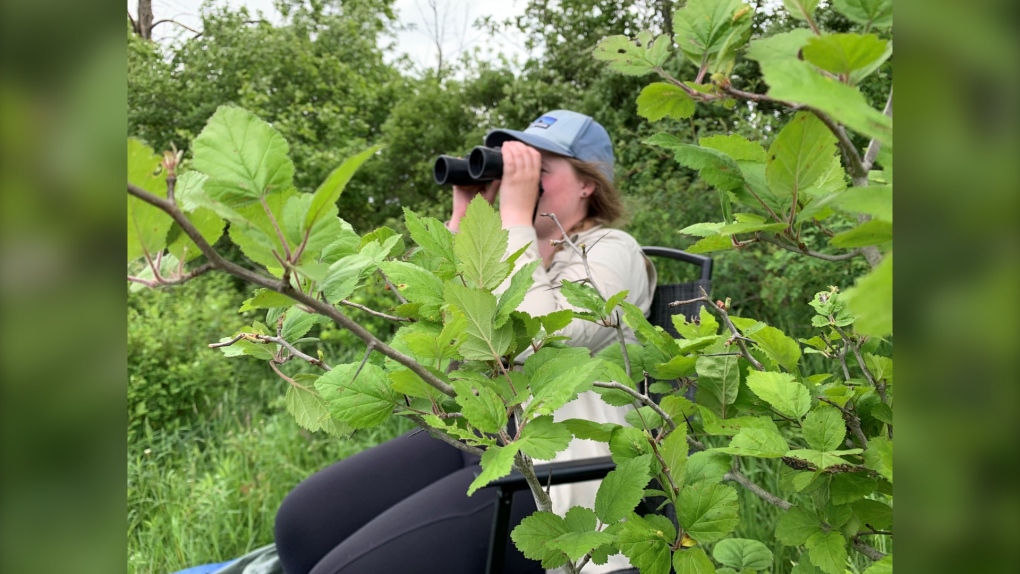Conservation authority works to save endangered spiny soft shell turtle
It’s an all-out effort to rescue one of southern Ontario’s most endangered species.
The eastern spiny soft shell turtle is at imminent risk of extinction, but staff from the St. Clair Region Conservation Authority (SCRCA) have been busy with a capture and release program along the Sydenham River, which runs through Lambton and part of Middlesex County.
“I think they're just considering their options trying to find the perfect spot, and they'll probably be back later in the day,” said Sarah Snetsinger, a watershed biologist with the SCRCA. She was sitting on a hill, observing female turtles along the riverbank.
“They're always looking for that really gravelly, sandy place to lay their eggs where it's not too steep. The spot here is pretty flat, kind of like a beach,” she said.
 Sarah Snetsinger, a watershed biologist with the St. Clair Region Conservation Authority on June 1, 2022. (Bryan Bicknell/CTV News London)Staff from the SCRCA have been busy keeping close watch on select locations along the river.
Sarah Snetsinger, a watershed biologist with the St. Clair Region Conservation Authority on June 1, 2022. (Bryan Bicknell/CTV News London)Staff from the SCRCA have been busy keeping close watch on select locations along the river.
Director of Biology Erin Carrol said they’re waiting for the turtles to lay eggs, which they will collect, then take to a lab for incubation.
“When I release those hatchlings that I've collected I know that they had no chance of survival without intervention, like next to none,” Carrol explained. “In the wild they would have been predated by raccoons or other mammals, so for me it gives me a great deal of personal fulfillment to be able to give them a little bit of a helping chance.”
It's estimated that there are only about 1,000 adult members of the species left in all of Canada. The Sydenham River is one of only a few places in Ontario where eastern spiny softshell turtle is known to nest.
The ‘Captive Hatch and Release’ program is part of the SCRCA’s recovery efforts for the species.
“There's quite a few different threats that are affecting the species, from habitat degradation, so loss of that habitat that they need to survive, as well as poaching,” said Kelli Smith, a watershed biologist with the SCRCA.
Smith said the rare turtles have been illegally collected for the pet trade, or even eaten as a delicacy — which is why they’ve asked CTV News not to disclose the location of this nesting site.
The turtles will lay eggs throughout the month of June. Incubation in the lab lasts about 60 days, before they’re sent back into the wild to fend for themselves.
CTVNews.ca Top Stories

Senate expenses climbed to $7.2 million in 2023, up nearly 30%
Senators in Canada claimed $7.2 million in expenses in 2023, a nearly 30 per cent increase over the previous year.
opinion Why you should protect your investments by naming a trusted contact person
Appointing a trusted person to help with financial obligations can give you peace of mind. In his personal finance column for CTVNews.ca, Christopher Liew outlines the key benefits of naming a confidant to take over your financial responsibilities, if the need ever arises.
Twins from Toronto were Canada's top two female finishers at this year's Boston Marathon
When identical twin sisters Kim and Michelle Krezonoski were invited to compete against some of the world’s most elite female runners at last week’s Boston Marathon, they were in disbelief.
NASA hears from Voyager 1, the most distant spacecraft from Earth, after months of quiet
NASA has finally heard back from Voyager 1 again in a way that makes sense. The most distant spacecraft from Earth hadn't sent home any understandable data since last November.
U.S. Senate passes bill forcing TikTok's parent company to sell or face ban, sends to Biden for signature
The Senate passed legislation Tuesday that would force TikTok's China-based parent company to sell the social media platform under the threat of a ban, a contentious move by U.S. lawmakers that's expected to face legal challenges.
Train derailed in Sarnia after colliding with a truck
Police are investigating after a transport truck collided with a train in Sarnia.
Photographer alleges he was forced to watch Megan Thee Stallion have sex and was unfairly fired
A photographer who worked for Megan Thee Stallion said in a lawsuit filed Tuesday that he was forced to watch her have sex, was unfairly fired soon after and was abused as her employee.
'My stomach dropped': Winnipeg man speaks out after being criminally harassed following single online date
A Winnipeg man said a single date gone wrong led to years of criminal harassment, false arrests, stress and depression.
Wildfire southwest of Peace River spurs evacuation order
People living near a wildfire burning about 15 kilometres southwest of Peace River are being told to evacuate their homes.





























